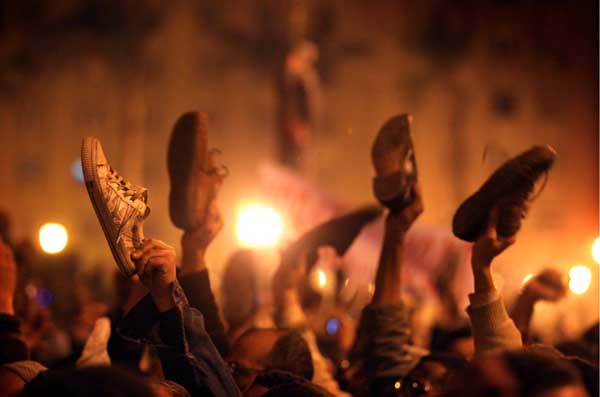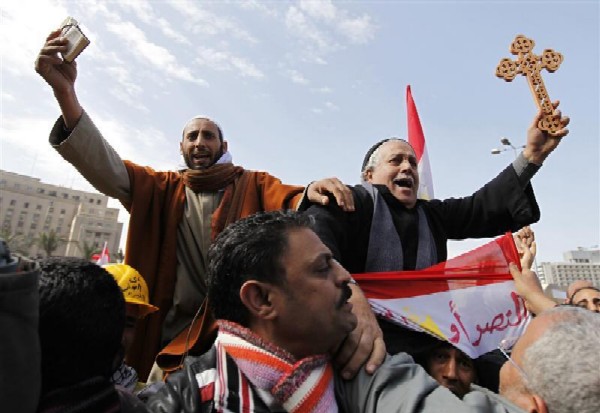Subscribe to ShahidulNews
Mubarak’s Ignominious Departure and the Fear Factor
by rahnuma ahmed
Mubarak is gone! Egypt is free!
Equally true is the fact that power has been assumed by the Supreme Council of the Armed Forces. That the 30 year-old state of emergency has not yet been lifted, neither has any time frame been set, nothing beyond the invocation, “as soon as the current circumstances are over.” ?Equally true is the fact that Egypt’s new, transitional (military) rulers have been quick to affirm Egypt’s commitment to all regional and international obligations and treaties, an implicit signal that the treaty of all treaties, Egypt’s peace treaty with Israel?propagated as a bulwark for peace and stability in the region, but in reality, one which helps sustain Israel’s military occupation of the West Bank and the seige of Gaza?is not under threat. An affirmation swiftly welcomed by the Israeli prime minister Benjamin Netanyahu, who described the treaty as “having greatly contributed to both countries,” as “the cornerstone for peace and stability in the entire Middle East”; close at his heels was US president Barack Obama who welcomed the Egyptian pledge to “stand by” its international obligations.
But, it is also true that while Egyptian demonstrators, both young and old, rallied to scrub off slogans and graffiti from walls, to clean up the streets of Cairo of rocks, debris of violence, charred remains of Mubarak’s effigy (“Clearing the streets is just a start. It is our country now”), protestors still camped out in Tahrir square, refusing to leave until the military issued official statements on their next steps. It is also true that pro-democracy activists insist that their revolt was not against one man but against the whole regime, which Mubarak and his predecessors, had instituted. It is also true that their invincible strength prevented Omar Suleiman?the CIA’s man in Cairo who devised and implemented the programme for renditioning and torturing terrorist suspects,?in whom Mubarak transferred authorities while still clinging to power?from taking charge. Pro-democracy activists insist that the revolution will not be over until all responsible for the hundreds of deaths will be investigated, tried and punished. It will not be over until Egypt’s stolen funds are restored.
Swiss banks have frozen assets of the ousted president, who is currently hunkered down in his residence at the Red Sea tourist resort, Sharm al-Sheikh. Former interior minister Habib El Adly, former prime minister Ahmed Nazif have been banned from travelling, their assets have been frozen. Former information minister Anna El Feqy has been placed under house arrest while rumors fly of business tycoons fleeing. But it is also true that while figures are totted up of how much the former president, his Welsh wife and their son fleeced Egypt, that while the huge personal wealth amassed by other members of the corrupt coterie are calculated, one does not hear of corruption within the army. That these stories are silenced.
But it is undeniable that the mass uprising was organic. One that persisted after Mubarak’s ouster, attested to by scenes of youths in Alexandria, the mainstay of the uprising, stopping cars and telling their occupants, abide by traffic rules. Of telling pedestrians, do not give bribes, read up the constitution.
It is also true that the mass uprising did not occur overnight but was, as Marwan Bishara reminds us, “the culmination of countless sit-ins, strikes, pickets, and demonstrations.”
That behind the 18 day popular revolt lies long years of grassroots mobilisation, the tireless efforts of scores of coalition builders who worked with labour unions and opposition parties, both old and new, including the Muslim Brotherhood. That we must not forget people such as, says Bishara, the late Mohammad El-Sayed Said who helped to found the Cairo Institute of Human Rights Studies and, the Egyptian Organisation for Human Rights. Who underwent arrest and torture for writing the “much-acclaimed report about the punishment of dissidents by torture” (Al-Ahram). Who died last year after a long period of ill-treatment at the hands of the Mubarak regime, and a 2-year struggle with cancer. Who was “much missed in Tahrir Square.” There were many others.

It is also true that Mubarak was suffering from severe delusions when he confided in a 20 minute telephone conversation to former Israeli defense minister Binyamin Ben-Eliezer, a close friend and ally, that he was looking for “an honorable way out” (Press TV, February 12, 2011). ?This was on Thursday, February 10, the day he refused to step down as anticipated, offering his “children” constitutional changes instead, and transfer of authorities to Suleiman. It was the speech greeted with raised shoes, the ultimate sign of dishonor for leaders and politicians in our parts of the world. One that was globally iconised by Muntazer al-Zaidi, the Iraqi journalist who threw his shoe at George Bush in 2008. A farewell parting.
It is also true that the US, Israel and western allies are the greatest obstacles to democratisation and peace in the Middle East. That the US now has to toe a careful line, that it should not appear too hasty in consigning puppet dictators?whose political use has rapidly expired in the face of mass uprisings?to (past) “history” as (present) “history unfolds” (Obama, the world was “witnessing history unfold [in Egypt]”, February 10). ?As other Middle Eastern dictators, close allies and friends of the US, closely watch every move of the administration while they themselves scurry around and offer handouts to their people, as they wonder what the future holds for them.
For, despite the fact that we do not know which deals have been struck in the corridors of power, which new ones are being negotiated now, right now, as I write, it is undeniable that storms of change are blowing over Egypt. Over the entire Middle East as Arabs rise in the thousands, in the millions in Egypt, in revolt against autocrats. For democracy. For freedom.
Some call it the domino effect, but this blunts awareness of other issues. It deflects attention from the long-propagated western myth that Arabs are not capable of achieving democracy. In other words, that political subjection is natural to them. A myth manufactured to hide the reality of autocrats either installed, and/or bolstered by US intervention, both politically and militarily. “We are now proud to be Egyptians, we have gained back our dignity as human beings” declared a woman excitedly to al-Jazeera, a sentiment voiced by millions of other Egyptians. A sentiment shared the world over, We are all Egyptians now. We are all Tunisians now.
“This revolution,” says Irish-American activist, former US marine, passenger on the MV Mavi Marmara Kenneth O’Keefe rightly, “is not a revolution for Tunisia and Egypt, it is a global revolution.” But he couldn’t be more right when he adds, “what the people in Tunisia and Egypt are doing is what we should be doing in the West but we haven’t done while our corrupt governments have sat by and allowed the Israeli blockade to continue, to torture all those who stand up against the Tunisian and Egyptian tyrannies, supported by the Western governments, in particular the US, Britain, the EU, all of them” (recorded in Gaza, January 27, 2011).
As Egyptians declared their pride in being Egyptian, US commentators dished out “the Muslim Brotherhood conspiracy theory” (Justin Raimondo, February 3, 2011). ?In the words of America’s former ambassador to the UN John Bolton, ?I think the question is whether and to what extent the Muslim Brotherhood and radical Islamists have infiltrated the leadership…I don?t think we have evidence yet that these demonstrations are necessarily about democracy. You know the old saying, ?one person, one vote, one time.? The Muslim Brotherhood doesn?t care about democracy, if they get into power you?re not going to have free and fair elections either.” But the Muslim Brotherhood, undoubtedly the largest and best organised opposition force in the country, had abstained January 25 demonstrations, had belatedly endorsed January 28 demonstrations.

The tone of the demonstrations has been nationalist and secular. Ibrahim Hodeibi, one of the new generation Brotherhood members and an important blogger, had earlier suggested that the Brotherhood slogan “Islam is the solution” should be replaced by the religiously neutral one, “Egypt is for all Egyptians” (Charles Hirschkind, The road to Tahrir), and this is what resounded from Tahrir square. Egypt’s Coptic Christian minority joined in the million-strong demonstrations too; it was more urgent, said many, to end Mubarak’s three decade rule than “any fears that a change of power might empower Islamist groups” (Reuters, February 1, 2011). No doubt the Brotherhood will be “a factor in post-Mubarak Egypt” but hardly decisive, for they will be a “part of the democratic mosaic” as will be other parties bearing other visions and agendas of political change (Raimondo).
But if these changes set a precedent that could be repeated in other countries, says Deputy Israeli prime minister Silvan Shalom, “Israeli national security might significantly be threatened.” ?Undeniably true, for democratic governments in the Middle East would see no reason to give precedence to Israeli national interests over and above their own. There may no longer be any close coordination between Israel and Arab regimes over intelligence and security. Over renditions and torture. On the contrary, it is quite likely that a democratically-elected government would want the Rafah border to be re-opened. And, could possibly want the Egypt-Israel peace treaty to be abrogated..?
As news of the Chairman of Joint Chiefs of Staff Admiral Mike Mullen’s visit to Israel and Jordan to “discuss security issues of mutual concern,” to reassure these “key partners of the US military’s commitment to that partnership” (February 13-14) filters through, I feel apprehensive. I can only ask, why are people in the West not rising up against their war criminal rulers? Against colonial occupations in Iraq, Afghanistan, Palestine? Against drone attacks that kill and maim civilians in Pakistan?
They need lessons in democracy and freedom. From the Egyptians. Tunisians. Yemenis. Jordanians…In short, from the Arabs.
Published in New Age Monday February 14, 2011




Leave a Reply
You must be logged in to post a comment.